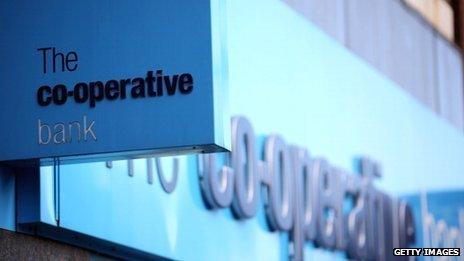Will Co-op officials vote themselves out of power?
- Published
- comments

Lord Myners wants the Co-op Group's elected officials to make what they may see as the supreme sacrifice - in voting for reforms that would give them a lot less power, and would give executives, professional non-executives and millions of Co-op members more power.
But the former City minister and ex fund-management boss, hired by Co-op to recommend changes to the way this sprawling mutual is governed and managed, fears that failure to adopt the reforms would be catastrophic.
He argues that it was the commercial naïveté of the elected officials that almost destroyed the group, by permitting Co-op Bank to manage itself in a near suicidal way, and by approving the too-expensive takeover of the Somerfield supermarket chain.
They failed to rein in dangerous ambition - and because Co-op has no conventional shareholders, because it is a mutual, the institutions of the City of London failed to restrain the Co-op in any way (not that these institutions would be seen as models of intelligent oversight for public companies, but maybe they are better than nothing).
Myners says Co-op Group only avoided total collapse by the skin of its teeth and thanks to the exhausting and exhaustive efforts of the executive team - who was led by Euan Sutherland till Tuesday, when he quit in frustration at what he saw as the intransigent opposition to reform of the elected officials.
But Co-op is not out of the woods. As Myners says, its takeover spree has left it lumbered with too much debt, around £1.5bn.
And as I mentioned earlier this week, the appalling financial performance of Co-op gives its banks, led by Barclays, the ability to seize its assets - which they would be obliged to do if they perceived Co-op Group to be in a death spiral.
To placate the banks, Co-op is selling important assets, its farms and - probably - its pharmacies.
But the banks will also want to see top quality management of its most important business, its supermarkets - which have been losing market share, and whose profits are likely to be squeezed by a prolonged and vicious price war that is the expected consequence of Morrison's rehabilitation plan.
But a decent successor to Sutherland is unlikely to be found unless and until the Co-op is perceived to be governable and manageable.
As Myners points out, just 50 of these - many of them remunerated by Co-op for their elected positions - have the ability to veto reforms that would threaten their status and rewards.
But if they do block the establishment of a more conventional board structure, and don't accept a future role for themselves largely as guardians of the mutual ideal, then - in Myners view - they may find they will have ringside seats as this most important of all co-operative organisations is destroyed in a conflagration of its own creation.